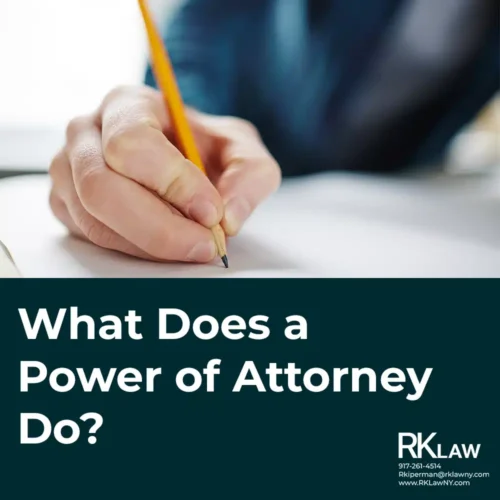What Does a Power of Attorney Do? Why is it useful? A Power of Attorney (POA) is a fundamental legal document that can profoundly impact the way personal and financial matters are managed. In this blog post, we’ll discuss the basic concept of POA, explore its different types, common uses, and why it’s often a critical component in personal and financial planning.
What is a Power of Attorney?
A Power of Attorney (POA) is a legal document that allows one person (the “agent” or “attorney-in-fact”) to act on behalf of another person (the “principal”) in specific or broad matters. It is an essential tool for managing affairs when the principal is unavailable, incapacitated, or otherwise needs someone else to handle certain tasks.
What Does a Power of Attorney Do? – Types of Power of Attorney
Power of Attorney can take several forms, depending on the scope and purpose of the authority granted:
General Power of Attorney
A General POA allows the agent to act on behalf of the principal in a wide range of matters, such as managing finances, conducting business transactions, and signing legal documents. This type of POA typically ends if the principal becomes incapacitated.
Durable Power of Attorney
A Durable POA remains in effect even if the principal becomes incapacitated. This type is commonly used to plan for situations where the principal can no longer make decisions due to illness or injury.
Limited (or Special) Power of Attorney
A Limited POA grants the agent authority to act in a specific capacity, such as selling a property, completing a specific financial transaction, or representing the principal in a particular legal matter. It often has a defined duration or purpose.
Medical Power of Attorney
A Medical POA, also known as a Healthcare Proxy, allows the agent to make healthcare decisions on behalf of the principal if they become incapacitated. It’s crucial for ensuring that someone trusted can make medical decisions when the principal cannot.
What Does a Power of Attorney Do? – Common Uses of Power of Attorney
Power of Attorney has a range of applications in everyday life. Here are some common uses:
Managing Financial Matters
An agent with a POA can handle financial transactions, pay bills, manage investments, and even file taxes on behalf of the principal. This is particularly useful when the principal is traveling, in the hospital, or otherwise unable to manage their financial affairs.
Handling Real Estate Transactions
A Limited POA is often used in real estate to grant an agent the authority to buy, sell, or manage property. This can be invaluable when the principal cannot be physically present for a transaction.
Managing Healthcare Decisions
A Medical Power of Attorney allows the agent to make healthcare-related decisions, ensuring that the principal’s medical preferences are respected when they can’t communicate their wishes. This can range from routine medical care to end-of-life decisions.
Legal Representation
An agent with a General or Limited POA can represent the principal in legal matters, such as signing contracts, settling claims, or handling legal disputes. This can save time and effort, especially if the principal is unable to attend to these issues personally.
Business Operations
For business owners, a POA can authorize an agent to act on behalf of the business in various matters, allowing operations to continue smoothly even when the principal is unavailable.
Gifting and Estate Planning
When a principal becomes incapacitated, the agent may need to take steps to reduce the principal’s estate for either medicaid, or, at times, tax planning. An agent, under a power of attorney may be authorized to make gifts, and engage in estate or medicaid planning to facilitate these goals in the best interests of the principal.
Choosing the Right Agent
Choosing the right agent for your Power of Attorney is crucial. The agent should be someone you trust with your finances, healthcare, or other significant matters. Consider their reliability, integrity, and willingness to take on the responsibility.
Final Thoughts on What Does a Power of Attorney Do
A Power of Attorney is an indispensable legal tool for managing your affairs and ensuring your wishes are respected. Understanding its different types and common uses helps you make informed decisions about when and how to use it. If you’re considering creating a POA, consult with a legal professional to ensure it meets your needs and complies with local laws.
By establishing a Power of Attorney, you can have peace of mind knowing that someone you trust can act on your behalf when needed, whether it’s managing your finances, handling real estate transactions, making healthcare decisions, or representing you legally.
For more information, please contact NYC Probate Litigation, Guardianship, NYC Probate and Estate Planning attorney Regina Kiperman:
Phone: 917-261-4514
Fax: 929-556-2089
Email: rkiperman@rklawny.com
Or visit her at:
40 Wall Street
Suite 2508
New York, NY 10005
Visit Regina on LinkedIn
Visit Regina on Facebook
This page is made available by the lawyer for educational purposes only as well as to give you general information and a general understanding of the law, not to provide specific legal advice. By using this site you understand that there is no attorney client relationship between you and the lawyer. The post should not be used as a substitute for competent legal advice from a licensed professional attorney in your state. ATTORNEY ADVERTISING.
